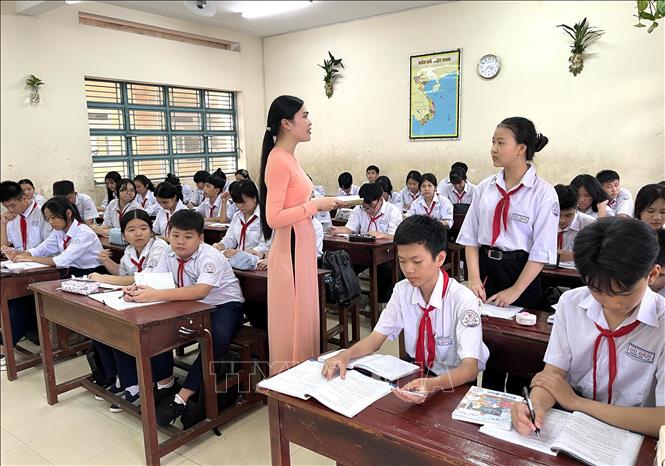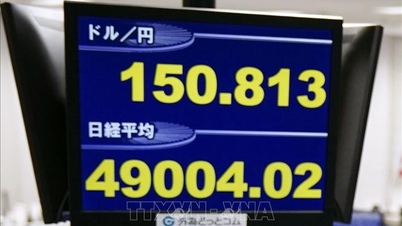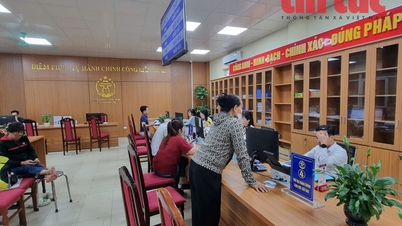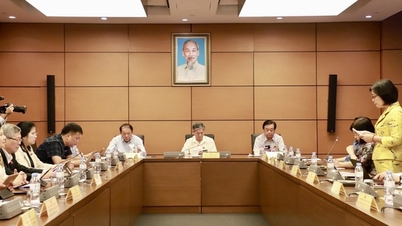This is a concrete step to realize the goal of developing a team of teachers with sufficient quantity and strong expertise, suitable for the requirements of educational innovation in the current period. In particular, this direction also helps the locality solve the problem of teacher shortage at some levels, meeting the requirements of socio -economic development of the province in the new period.

Synchronized solutions for teacher shortage
According to the Department of Education and Training of Tay Ninh, in the 2025-2026 school year, the whole province has 1,024 educational institutions from preschool to high school (including 965 public schools and 60 non-public schools) with more than 573,000 students; of which, primary school has over 224,000 students, middle school has 170,000 students and high school has nearly 78,000 students.
Despite the rapid increase in student numbers, the province is currently short of 2,481 teachers (528 preschool teachers, 735 primary school teachers, 917 secondary school teachers, and 301 high school teachers) along with 349 school staff. The main reason is that the source of new recruits is still limited, unable to compensate for the number of retirees, leavers, or job transfers due to difficult working conditions and income.
For now, schools are allowed to contract teachers outside the payroll to ensure teaching and learning plans, especially for specific subjects. However, the shortage of teachers, especially subject teachers, still causes difficulties in arranging and organizing teaching schedules for 2 sessions/day in many facilities.
According to the Department of Education and Training of Tay Ninh, in parallel with short-term contracts, the province is promoting synchronous activities such as regular training, improving teacher qualifications and management capacity for school staff, meeting principal standards and teacher professional standards. The sector also focuses on equipping teaching skills according to the 2018 General Education Program, especially active teaching methods, innovative testing and assessment and application of information technology.
Notably, Tay Ninh's implementation of a teacher training plan according to social needs, in accordance with Decree No. 116/2020/ND-CP dated September 25, 2020 and Decree No. 60/2025/ND-CP dated March 3, 2025 of the Government, is considered one of the fundamental solutions to overcome the current shortage of teachers.
Order training at reputable educational institutions
According to the plan of the Department of Education and Training of Tay Ninh province, the total demand for teacher training in 2025 of the whole province is 1,246 people; of which, there are 328 preschool teachers (including 110 people with college degrees, 218 people with university degrees); 478 primary school teachers; 439 middle school and high school teachers (including specialized subjects such as Music, Fine Arts, Information Technology, Physical Education, Foreign Languages). In addition, the province has 1 quota for training special education teachers.
The training period for college level is 3 years, university level is 4 years. The training subjects include university and college students studying teacher training majors in full-time form, residing in Tay Ninh province (including the former Long An and Tay Ninh provinces). This policy does not apply to teachers sent to study to improve their qualifications according to Decree No. 71/2020/ND-CP dated June 30, 2020 of the Government.
According to the Director of the Department of Education and Training of Tay Ninh province, Nguyen Quang Thai, the training is carried out by ordering at prestigious training institutions such as: Ho Chi Minh City University of Education, Can Tho University, Saigon University, Ho Chi Minh City University of Technical Education, Dong Thap University, Ho Chi Minh City Central Pedagogical College, and a number of other pedagogical training institutions in and outside the province. Pedagogical students are supported by the State with tuition fees equivalent to the level collected by the training institution and living expenses of 3.63 million VND/month during the study period (maximum 10 months/school year). In the case of students studying by credits, the training institution is allowed to convert the appropriate support level, but the total cost does not exceed the support level per school year.
For teacher training students trained under the order method, every year, the agency assigns the task of preparing a training budget estimate and reports to the competent authority for approval to pay tuition and living expenses through the teacher training facility.
The total budget for implementing the province's plan to train teachers according to social needs in 2025 is estimated at about 262.76 billion VND for the entire course, paid from the state budget, divided into phases each year: 19.42 billion VND in 2025, 67.32 billion VND in 2026, 67.32 billion VND in 2027, 65.60 billion VND in 2028, and 43.10 billion VND in 2029.
According to Vice Chairman of Tay Ninh Provincial People's Committee Doan Trung Kien, the Provincial People's Committee has assigned the Department of Education and Training to preside over and coordinate with departments, branches, and localities to synthesize needs, place orders with training institutions, organize enrollment, review job positions, training majors, and recruitment targets appropriate to reality.
By implementing the teacher training plan according to social needs, Tay Ninh shows its initiative in developing pedagogical human resources, ensuring a sufficient supply of teachers for all levels of education, in line with the requirements of fundamental and comprehensive education reform in the new period. This is not only a key, strategic solution to improve the quality of comprehensive education, but also a sustainable and in-depth step in solving the problem of teacher shortage, creating a foundation for the stable and synchronous development of the provincial education system.
Source: https://baotintuc.vn/giao-duc/chu-dong-dao-tao-giao-vien-dap-ung-yeu-cau-thuc-tien-thoi-ky-moi-20251021075355974.htm


![[Photo] Chairman of the Hungarian Parliament visits President Ho Chi Minh's Mausoleum](https://vphoto.vietnam.vn/thumb/1200x675/vietnam/resource/IMAGE/2025/10/20/1760941009023_ndo_br_hungary-jpg.webp)



![[Photo] Prime Minister Pham Minh Chinh meets with Speaker of the Hungarian National Assembly Kover Laszlo](https://vphoto.vietnam.vn/thumb/1200x675/vietnam/resource/IMAGE/2025/10/20/1760970413415_dsc-8111-jpg.webp)
![[Photo] National Assembly Chairman Tran Thanh Man holds talks with Hungarian National Assembly Chairman Kover Laszlo](https://vphoto.vietnam.vn/thumb/1200x675/vietnam/resource/IMAGE/2025/10/20/1760952711347_ndo_br_bnd-1603-jpg.webp)









































































































Comment (0)